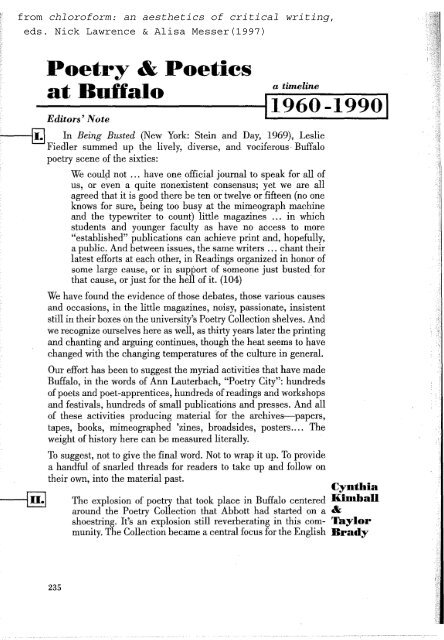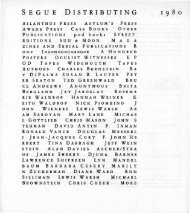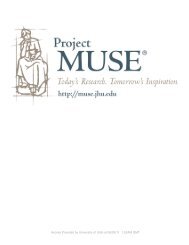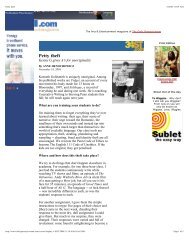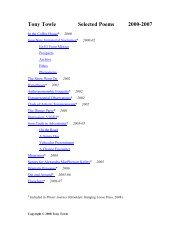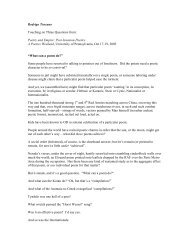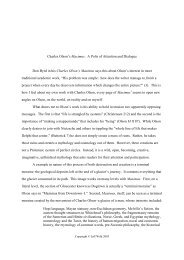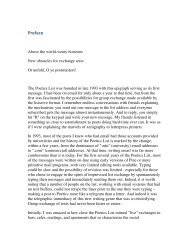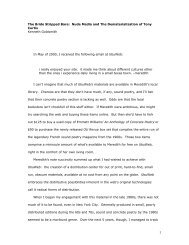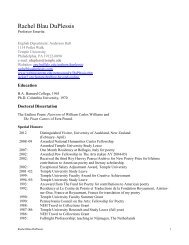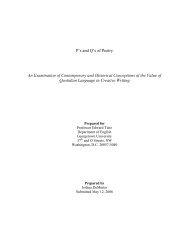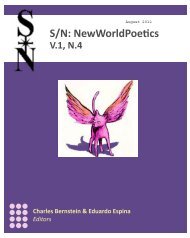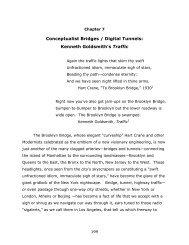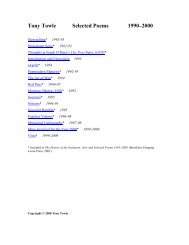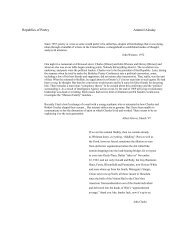Poetry & Poetics at Buffalo - Electronic Poetry Center - University at ...
Poetry & Poetics at Buffalo - Electronic Poetry Center - University at ...
Poetry & Poetics at Buffalo - Electronic Poetry Center - University at ...
You also want an ePaper? Increase the reach of your titles
YUMPU automatically turns print PDFs into web optimized ePapers that Google loves.
department, with Al Cook's notion th<strong>at</strong> all the dissert<strong>at</strong>ions<br />
gener<strong>at</strong>ed here could come out of the m<strong>at</strong>erials stored<br />
there.-MH<br />
In 1935, Charles Abbott, the first librarian of Lockwood Memorial<br />
Library, laid the found<strong>at</strong>ions for <strong>Buffalo</strong>'s present st<strong>at</strong>us as poetic<br />
center by deciding to focus resources on cre<strong>at</strong>ing the broadest<br />
possible collection of twentieth-century poetry in English. In 1939,<br />
MarfBarnarrl was hired as the first cur<strong>at</strong>or ofthe collection, working<br />
closely with Abbott. Together they set about collecting documents<br />
from every aspect of poets' literary production, from notebooks and<br />
worksheets to first published versions of poems, variant editions,<br />
limited fine-press public<strong>at</strong>ions, and a range of other forms of printing<br />
and reproduction. They wrote to thousands of poets requesting<br />
the contents of their waste baskets, before other libraries had begun<br />
to consider such documents valuable. Poets ranging from Auden to<br />
Zukofsky responded, with letters and manuscripts, notebooks and<br />
diaries. Today the Collection houses some 8 million individual<br />
pieces of paper, by authors ranging from T. S. Eliot to Ted Enslin,<br />
Helen Adam to Ed Dorn, and is known among scholars for its<br />
extensive collection of works by James Joyce, Dylan Thomas,<br />
Robert Graves, and William Carlos Williams.<br />
In her book Assault on Mt. Helicon (Berkeley: DC Press, 1984),<br />
Mary Barnard writes:<br />
The idea th<strong>at</strong> it was part of a university's business to collect<br />
m<strong>at</strong>erials for research into the work of modern poets was ...<br />
strange (not to say scandalous) to most American professors,<br />
. including those on the DB campus.... No self-respecting<br />
scholar would think of wasting his time on living writers.<br />
Charles Abbott himself believed th<strong>at</strong> the Collection would<br />
come into its own "perhaps in a hundred years." The scholars<br />
would begin to come when we were long gone, he said, but the<br />
time to collect m<strong>at</strong>erials was the present. He was collecting<br />
for posterity. Living poets would one day be dead, the present<br />
would have become the past, the scholars would eventually<br />
become interested, and by th<strong>at</strong> time the m<strong>at</strong>erials they needed<br />
would be much more difficult and expensive to obtain. This<br />
was surely true. The fifty dollars we paid for Williams's little<br />
pamphlet called simply Poems (Rutherford, 1909) seemed<br />
236
fantastic even to me, but thirty-five years l<strong>at</strong>er, the same book<br />
sold <strong>at</strong> auction for sixteen thousand. Undoubtedly we were<br />
collecting a lot of junk, too. The terms of the Carnegie grant<br />
would have made th<strong>at</strong> inevitable, even if we ourselves had<br />
been sure th<strong>at</strong> we knew wh<strong>at</strong> the scholars of the twenty-first<br />
century would consider junk. (176)<br />
We cannot help but hear Barnard's account as an endorsement of<br />
our own approach to this labor of collection. In the spirit of ongoing<br />
collabor<strong>at</strong>ion, we invite members of the community to add their<br />
corrections, anecdotes, and interventions to this section for inclusion<br />
in future issues.<br />
[fI.1 We would like to acknowledge the generous assistance and<br />
advice of Robert Bertholf, Cur<strong>at</strong>or of the <strong>Poetry</strong> and Rare Books<br />
Collection; Chris Densmore, Acting Director of <strong>University</strong><br />
Archives, and· Shonnie Finnegan, Archivist Emeritus, in loc<strong>at</strong>ing<br />
and securing access to the many fugitive documents from which<br />
this section has been assembled; Michael Basinski, for his knowledge<br />
of names, d<strong>at</strong>es, and events which otherwise would have<br />
eluded us; Robert Creeley, William Sylvester, Sally Anderson<br />
Fiedler, Carl Dennis, Raymond Federman, Joseph Conte, Albert<br />
Glover, Fred Wah, Mac Hammond, K<strong>at</strong>ka Hammond, and Ansie<br />
Silverman Baird, for agreeing to particip<strong>at</strong>e in the interviews<br />
without which none of the anecdotal inform<strong>at</strong>ion in this section<br />
could have been obtained; Cass Clarke, for m<strong>at</strong>erials from the<br />
archives of the l<strong>at</strong>e Jack Clarke; and Mark Hammer, for generously<br />
allowing us access to his written introductions to readings given by<br />
visiting and local poets, and for providing, through his work with<br />
the Red Flannel Reading Series, an extra-academic space in which<br />
a poetry community in <strong>Buffalo</strong> might continue to take shape.<br />
AG-Al Glover<br />
ASB-Ansie Silverman Baird<br />
MB-Michael Basinski<br />
JC-Joseph Conte<br />
RC-Robert Creeley<br />
CD-Carl Dennis<br />
237<br />
<strong>Buffalo</strong>, NY<br />
June 1996<br />
SAF-Sally Anderson Fiedler<br />
MH-Mac Hammond<br />
KH-K<strong>at</strong>ka Hammond<br />
WS-William Sylvester<br />
FW-Fred Wah
243-----------------11964\<br />
"Olson spent half the semester saying we couldn't do anything because we didn't have ...<br />
The Worship ofPriapus.... It was an obscure nineteenth-century tome, but Olson talked<br />
about it as if it contained everything we needed to know about the origin of the universe.<br />
But, since we couldn't get it, we couldn't have the class, and he went on for weeks like this.<br />
Niagara Frontie,r Review Summer 1964 $1.00<br />
"One day a few of us-Fred Wah, Andrew Crozier, Mike Glover, and I-made a trip to<br />
Cleveland to go to Jim Lowell's Asphodel book shop and to a thenlegendary bookstore th<strong>at</strong><br />
had a square mile of used books underground. It was totally dark, and you'd go from one<br />
room to another pulling on the light with a chain. Everything was completely dusty; no one<br />
had looked <strong>at</strong> the books for years, obviously. We spent all day there, and finally we found<br />
The Worship ofPriapus, along with some early H.D. and Mina Loy, I remember. Needless<br />
to say, we jumped for joy and rushed back to class, as it were, triumphant. But it was too<br />
l<strong>at</strong>e, Olson said, too l<strong>at</strong>e, and Payne Knight was wrong anyway." (Stephen Rodefer, <strong>Poetry</strong><br />
Flash interview)
119641-----------------244<br />
"I found the Payne Knight in a store in <strong>Buffalo</strong>-it was on Main Street, I think-and<br />
brought it into class. Olson immedi<strong>at</strong>ely borrowed the book. A week went by. Then he<br />
announced in class th<strong>at</strong> the passage he remembered wasn't the way he thought it was, and<br />
he threw the book against a wall: 'This is bullshit.' Silence. Class continued."-FW<br />
September 25-Frank O'Hara reads in Diefendorf Hall.<br />
October 22-A revision of "St<strong>at</strong>ement on Poets and their Function in the Department of<br />
English" reads as follows:<br />
In building a consistent program, the English Department proposes to consider three kinds of poets:<br />
A) Master poets with intern<strong>at</strong>ional reput<strong>at</strong>ions.<br />
B) Professional poets who are als9 academic professionals, having a Ph.D. and/or standard academic<br />
specialties (linguistics, bibliography, period scholarship, etc.).<br />
C) Professional poets who may be regarded as academic professionals when they have done<br />
considerable college and university teaching <strong>at</strong> levels above those of our "200" courses, though they do not<br />
have a standard specialty other than periodical criticism.<br />
(We are not considering here c<strong>at</strong>egory D, professional poets with little or not [sic] academic experience; such<br />
poets are best utilized, transitionally or permanently, only as visitors.)<br />
As for their use in the curricular functions of the Department, poets in c<strong>at</strong>egory B, by virtue of their<br />
specialty other than poetry, present no need for definition <strong>at</strong> all; their poetry, in fact, constitutes a "bonus"<br />
professionally for the Department.<br />
All other poets are useful for a Department concentr<strong>at</strong>ing on modern liter<strong>at</strong>ure and criticism in the<br />
following ways:<br />
1) Cre<strong>at</strong>ive writing.<br />
Poets are uniquely qualified to teach courses in cre<strong>at</strong>ive writing. In the light of our emphasis, we should<br />
expand the undergradu<strong>at</strong>e offerings in cre<strong>at</strong>ive writing beyond the single course taught <strong>at</strong> present. We<br />
subscribe to the principle honored in departments of music and art th<strong>at</strong> to practice the techniques of<br />
the art provides for all students a valuable supplement to studying its history and criticism.<br />
In the gradu<strong>at</strong>e program, we do not <strong>at</strong> present plan to follow the Iowa and Johns Hopkins plans of<br />
formal gradu<strong>at</strong>e degrees in<br />
Cre<strong>at</strong>ive Writing. As <strong>at</strong> Harvard<br />
News Service<br />
STAl1l UNIVERSITY OF NEW YORK AT IlUFFIJ.O<br />
flSr.triy lilt 'UftI9tr.", _/Btl!I.'" . .. fIN"'" ,. 11'6<br />
John F. Conte<br />
Assistant Direotor <br />
Publio Inform<strong>at</strong>ion<br />
BUFFALO, N. Y. - Hr. Frank O'Hara, director of exhibits<br />
for the Museum of t1c>dern Art in New York, will read selections of<br />
his poetry <strong>at</strong> the Sta.te <strong>University</strong> <strong>at</strong> <strong>Buffalo</strong> Friday, (September 25th),<br />
, <strong>at</strong> lj p. m. in room 146, Diefendorf Hall.<br />
Hr. O'Hara, a winner of the Hopwood Award for poetry in<br />
1951, is the author of "Kedit<strong>at</strong>ions in an Emergenoy," "Seoond Avenue,"<br />
and several other works inoluding vere!! plays. Hill workS comprise the<br />
current: issue of "Audi:t." " literary magazine edited in <strong>Buffalo</strong>.<br />
Mr. O'Hara received his M.A. from the Unil/e.rei1:Y of l1ichigan<br />
and was one of the founders of the Poets The<strong>at</strong>re in New' York City.<br />
Mr. O'Hiilra is one of several poets whose readings will be<br />
sponsored dUI'ing the fall semester by the FriendS of the Lockwood<br />
Library, the Charles Abbott <strong>Poetry</strong> Reading Fund and the Urdvel'Sity.<br />
and Berkeley, we will henceforth<br />
accept some course work in cre-<br />
T.hphone 1I31-2139 I Aru CQ,h 716 <strong>at</strong>ive writing (perhaps a maximum<br />
l'Oa.l.llPITIONAL INfORMATION CONTACT, of six hours) as a part of training<br />
for an advanced degree and pro<br />
pose to add a single advanced<br />
course in cre<strong>at</strong>ive writing open<br />
only to gradu<strong>at</strong>e students.<br />
2) Courses in modern liter<strong>at</strong>ure<br />
and literary criticism.<br />
Poets, (so long as they<br />
are already professional academics)<br />
are to be regarded as<br />
capable ofteaching courses about<br />
modern liter<strong>at</strong>ure, on undergradu<strong>at</strong>e<br />
and gradu<strong>at</strong>e levels. The<br />
following are courses now listed<br />
by tbe Department th<strong>at</strong> a poet<br />
might teach: Modern <strong>Poetry</strong>,<br />
Critical Approaches to Liter<strong>at</strong>ure,<br />
Intellectual Backgrounds of<br />
Modern <strong>Poetry</strong>, American<br />
Music-Visual Arts,<br />
Liter<strong>at</strong>ure of the L<strong>at</strong>e Nineteenth<br />
arid Early Twentieth Centuries.
247-----------------119651<br />
"I remember, getting back to Olson, <strong>at</strong> one point someone said, 'Well, wh<strong>at</strong> about the<br />
institution?' Charles said, 'You're always in an institution in this country: in a line or<br />
something-your mail, your hospital situ<strong>at</strong>ion, your streets-it's all an institution.' It's<br />
absurd to argue against the condition of the institution: it's wh<strong>at</strong> you do in an institution<br />
th<strong>at</strong>'s interesting, not whether it exists. It's not me and it, it's how you use this common<br />
place."-RC<br />
March 26-Ruth Stone reads in Diefendorf HalL<br />
April6-Spring Arts Festival: Olson, John Wieners, and Ed Sanders read poetry in Haas<br />
Lounge.<br />
April 9-Gary Snyder reads in Diefendorf Hall.<br />
Second Summer Program in Modern Liter<strong>at</strong>ure-English poet, critic, and transl<strong>at</strong>or Eric<br />
Mottram teaches "Studies in American Liter<strong>at</strong>ure." Mottram returns to VB in 1993 as a<br />
poetics program visiting fellow.<br />
Berkeley <strong>Poetry</strong> Conference-Attended by several notable <strong>Buffalo</strong> students and faculty,<br />
including Olson and Creeley. "A good document for Olson's teaching would be the tape of<br />
his last night's 'reading' <strong>at</strong> the Berkeley conference. He just goes on for two hours, talking,<br />
never finishing a single poem, hardly even starting one. People were getting nervous, while<br />
others loved it. Lew Welch was going nuts on the side, trying to get him to stop talking and<br />
start reading. Even Creeley was trying to get him to pause and read a poem. But Olson<br />
would just reply something to the effect th<strong>at</strong> poetry was politics, and this was the smoking<br />
caucus of poetry. For him it was a convention, and he was giving the closing address"<br />
(Stephen Rodefer, <strong>Poetry</strong> Flash interview).<br />
"We have the dilemma th<strong>at</strong> so far as a person working actively in the English Department<br />
is a professional, presume th<strong>at</strong> he or she has a committed intellectual interest in some range<br />
ofresearch aT qualific<strong>at</strong>ion ofth<strong>at</strong> sort, and therefore reads a lot and checks it out and keeps<br />
up with the bulletins and m<strong>at</strong>erials which have to do with it, and so on and so forth-th<strong>at</strong><br />
th<strong>at</strong> is the nexus th<strong>at</strong> gives the authority to teaching. Possibly. On the other hand, as<br />
anyone who's been to school knows, teaching really has remarkably)ittle to do with the<br />
subject, and a good teacher is maybe virtually inept with respect to the subject. I know I've<br />
been taught brilliantly by teachers who really didn't know anything about their subjects<br />
specifically, but yet invited-not only invited but prompted me to learn a gre<strong>at</strong> deal. "-RC<br />
"It was all Charles. It was all Charles talking, and J(lagging, and prodding.... He would<br />
always have a start, a beginning to each class. In retrospect, I realized he was a master<br />
teacher, he had this ability to get students started.... I remember in the Modern American<br />
<strong>Poetry</strong> class, 'Drummond Hadley' was wh<strong>at</strong> he wrote on the board <strong>at</strong> the end of the year;<br />
'Drummond Hadley'-to be continued ..."-FW \<br />
September-Charles Olson teaches <strong>at</strong> <strong>Buffalo</strong> for only two weeks of the fall semester, then<br />
returns to Gloucester, Massachusetts.<br />
"When 0 left in fall '65, I g<strong>at</strong>hered Clarke, Butterick, and Wah .. , to form the Institute of<br />
Further Studies to continue the work we had begun in the previous year. Because Jack was<br />
a member of the faculty, we named him 'director.' n. I began the Magazine of Further<br />
Studies, which went through six issues."-AG
119671-----------------250<br />
March 16-W. S. Merwin reads in<br />
Diefendorf. "He was invited to read, like<br />
everyone else, and be paid a certain<br />
amount of money, but in order·for the<br />
<strong>University</strong> to pay him, he had to sign a loyalty<br />
o<strong>at</strong>h [presumably the same Feinberg<br />
Certific<strong>at</strong>e th<strong>at</strong> had eost Gregory Corso his<br />
job in 1965-eds.]. He refused, so he read<br />
anyway, knowing he was not going to be<br />
paid."-CD. ("Merwin returns to <strong>Buffalo</strong><br />
November 8, 1996 for the Silverman<br />
Reading, and UB has agreed to pay him<br />
the fee withheld 28 years ago"-ASB).<br />
April 7-David Wagoner reads in<br />
Diefendorf.<br />
THE STATE UNIVERSITY Of NEW YORK AT BUFFAlO<br />
The Friends of the Lockwood Memorial Library<br />
cordially invite you to hear<br />
W.S.MERWIN<br />
The American poet and transl<strong>at</strong>or, author of<br />
Pers;us<br />
The Cid<br />
A Mask for Janus<br />
The Dancing Bears<br />
Green with Beasts<br />
The Moving Target<br />
Some Spanish Ballads<br />
Fred Wah receives his M.A. in English <strong>at</strong><br />
SUNY <strong>Buffalo</strong>, "for two long papers,<br />
The· Drunk in the Furnace<br />
who will read from his poetry<br />
'Linguistics and the New American Thursday, March 18, 1981<br />
Prosody' and something on Chaucer"-FW 4:00 p.m. Room 146 Diefelldorf<br />
lbe nbott Reading fund .1<br />
Summer Session-Anselm Hollo, poet<br />
and transl<strong>at</strong>or of European fiction and poetry, teaches "Major Literary Figures." Poets<br />
reading under the auspices of the Summer Session include Creeley, Sylvester, Feldman,<br />
Clarke, Dorn, Hammond, Hollo, Touster, Coxe, Rumaker, Logan, Carroll.<br />
Karl Gay, once priv<strong>at</strong>e secretary to the poet Robert Graves, becomes cur<strong>at</strong>or of the <strong>Poetry</strong><br />
Collection.<br />
Poet Robert Hass is hired <strong>at</strong> UB and teaches for four years.<br />
Lemar, a group calling for the legaliz<strong>at</strong>ion of marijuana led by UB student Mike Aldrich,<br />
organizes a benefit reading th<strong>at</strong> draws Abbie Hoffman, Jerry Rubin, and Timothy Leary.<br />
"One guy said he'd do anything. Challenged to take off his clothes, he did. In the Dorothy<br />
Haas Lounge <strong>at</strong> the UB campus. There was a party <strong>at</strong> Leslie [Fiedler]'s house after. I wrote<br />
'Honky in the Woodpile' about th<strong>at</strong> era."-WS<br />
Leslie Fiedler, professor of English <strong>at</strong> UB, arrested for possession of marijuana.<br />
"When acid hit, th<strong>at</strong> changed the whole scene.... David Tirrell got fried on acid. It<br />
changed the <strong>at</strong>tention-got more mystical."-FW<br />
The first and only issue of Conditions is published. Contributors include Fred Wah, George<br />
Butterick, Albert Glover, Lewis MacAdams, and Allen De Loach.<br />
December 13-UUAB Liter<strong>at</strong>ure and Drama Committee sponsors "Symposium of<br />
Possibilities for the Future" <strong>at</strong> 4 p.m. in the Conference The<strong>at</strong>er. The Symposium fe<strong>at</strong>ured<br />
"<strong>Electronic</strong> <strong>Poetry</strong>" by Ron Hauser, Ray Federman, Lewis MacAdams, William Sylvester,<br />
Joe Romanowski, Mac Hammond, and "The Audience." Hauser, Sylvester and Federman<br />
perform the trilingual Dada poem, "Le General Cherche une Maison pour Louer." Hauser<br />
read the German, Sylvester the English, and Federman the French, simultaneously.
253-----------------119681<br />
June 27-Robert Duncan, in <strong>Buffalo</strong> for part of the summer, reads in the Conference<br />
The<strong>at</strong>er.<br />
July 17-<strong>Electronic</strong> <strong>Poetry</strong> Present<strong>at</strong>ion in Norton Conference The<strong>at</strong>er.<br />
July 3O-N<strong>at</strong>haniel Tarn reads.<br />
November 20-Robert Bly reads in Haas Lounge.<br />
December 18-Jerome Rothenberg reads in the Conference The<strong>at</strong>er <strong>at</strong> 2 p.m., and John'<br />
Berryman reads in the Millard Fillmore Room <strong>at</strong> 8 p.m. .<br />
-----------------.1119691<br />
Mac Hammond's book, Cold Turkey, with its accompanying record of multi-track poetry, is<br />
one product of the interest-manifested by the number of <strong>Electronic</strong> <strong>Poetry</strong><br />
Conferences-in exploring the possibilities new technologies held for poetry. "I discovered<br />
th<strong>at</strong> 1 could get them to record my voice on three different tracks and play them all<br />
<strong>at</strong> once. On the one track 1 read, for example, a poem on Thanksgiving from a suite of<br />
poems called The Holidays, on another track I repe<strong>at</strong> the phrase 'Thank you,' and on the<br />
third I speak random cliches appropri<strong>at</strong>e for the holiday, like 'Don't talk with your mouth<br />
full,' and 'More cranberries, anyone?' So here's the poem made up of language th<strong>at</strong> is both<br />
orderly and disorderly <strong>at</strong> the same time, elements of the banal and elements th<strong>at</strong> are<br />
ale<strong>at</strong>oric. At first I left the three tracks running parallel however they occurred, but l<strong>at</strong>er<br />
found it more interesting to orchestr<strong>at</strong>e them."-MH. "The result is an expansion of the<br />
poetry's printed form into a new, auditory medium."-Dust jacket of Cold Turkey<br />
Spring semester-Michael Hamburger, poet, transl<strong>at</strong>or, critic, <strong>at</strong> DB as Visiting Professor<br />
in the Department of German and Slavic. Offers courses on Holderlin and Problems of<br />
Modem German <strong>Poetry</strong>.<br />
February 20-Louise Gluck reads in Norton.<br />
March 19-Brother Antoninus (William Everson) reads in Acheson HalL "Brother<br />
Antoninus gave a very histrionic reading, wearing his cowl, beginning with very heavy<br />
bre<strong>at</strong>hing to let the audience know the depths of his feeling. We were on pins and needles.<br />
At one point, someone left, slamming the door, and he stopped and said, '<strong>Buffalo</strong>, <strong>Buffalo</strong>,<br />
how do you tre<strong>at</strong> your poets?'"-CD<br />
April 2I-Diane Wakoski reads in Conference The<strong>at</strong>er.<br />
July 2-James Wright reads in Conference The<strong>at</strong>er.<br />
July 16-Anselm Hollo reads in Conference The<strong>at</strong>er.<br />
July 30-N<strong>at</strong>haniel Tarn reads in Conference The<strong>at</strong>er.<br />
Linda Reinfeld and Lewis MacAdams receive M.A.s in English <strong>at</strong> DB.<br />
October I7-Lawrence Ferlinghetti reads in Norton. "... [T]he trim, nearly white-bearded<br />
Mr. Ferlinghetti drew his legendary self up on the stage, strummed an autoharp in opening<br />
and sung [sic] a few phrases of an Indian chant before announcing in a loud voice: 'I<br />
hereby declare the end of the war. Against youth.'" (<strong>Buffalo</strong> Evening News 10/18/69, A7)<br />
November 4--Richard Brautigan reads in Acheson.
l19691f------------------ 254<br />
November 5-Emmett Williams, one of the founders of the Concrete <strong>Poetry</strong> movement and<br />
participant in the Fluxus art movement, reads in Norton.<br />
November 17-William Stafford reads in Norton.<br />
December 5-Gary Snyder reads in Norton. "Gary Snyder pulled in nearly 300 people th<strong>at</strong><br />
night. It was a grand reading; he had a huge following."-CD<br />
119701---------<br />
January 10-Charles Olson dies.<br />
"When Charles died, I had a vision of the next issue of the Magazine ofFurther Studies<br />
being a series of 'fascicles' (like the Cambridge Ancient History we had used earlier for<br />
Pleistocene Man (Jack's gre<strong>at</strong> design which Charles didn't like)) in keeping with some<br />
thought in Letters for Origin. So Jack put the names on the plan. I got some money for a<br />
mimeo machine, and ruM Selectric, and a bit of other equipment from the Ford<br />
Found<strong>at</strong>ion via SLU [St. Lawrence <strong>University</strong>] and began production in 1972 with Drum's<br />
Vision. Everything was done by hand."-AG
255-----------------------{19701<br />
Clarke and Glover assign numbered portions of Olson's poem to a group of local students<br />
and poets, who are to write monograph-length responses. The resulting series of pamphlets<br />
is published by the Institute of Further Studies from Canton, New York. (The project continues<br />
to this day, with Robin Blaser's Bach's Belie/in 1995 as the most recent contribution.<br />
While the pamphlets are numbered so as to correspond with the original poem-sections,<br />
they have not been published sequentially-some contributions are not yet complete.)<br />
TITLES IN THE CURRlCULUM OF THE SOUL<br />
Preface--Pleistocene Man-Charles Olson (1968): Several of Olson's letters to Jack written in 1965.<br />
The book has been called "a revealing exposition of the poetics of the l<strong>at</strong>er Maximus Poems-and a<br />
fascin<strong>at</strong>ing example of history as cosmography."<br />
No.1-The Mushroom-Albert Glover (1972): "underne<strong>at</strong>h a wild apple tree I tasted your golden flesh"<br />
No.2-Dream-Duncan McNaughton (1973): "Ginsberg's eyes rolled like huge buttons, while Gregory<br />
leaped as if infected and stretched his mouth. I looked back to Olson but he had not moved."<br />
No. 3-Woman-John Wieners (1972): "Working without guidelines here, I abjectly suspicion<br />
retrograde aspersions as to why I do not accept this Assignment as an insult; and capitul<strong>at</strong>ing I<br />
initi<strong>at</strong>e my circumspection without either summ<strong>at</strong>ion or interlocution ..."<br />
No. 4--Mind-Robert Creeley (projected).<br />
No. 5-Language-Ed Dorn (projected).<br />
No.6-Earth-Fred Wah (1974): "Everything's out there larger elsewhere and then I add myself who's<br />
w<strong>at</strong>ching."<br />
No.7-Blake-Iohn Clarke (1973): "his forehead divides into streaks of green and purple like those on a<br />
tiger's forehead ..."<br />
No. 8-Dante-Robert Duncan (1974): "He picks up on the fugitive tang of mace/amidst the savory mass"<br />
No. 9-Homer's Art-Alice Notley (1990): "Mother Mask has twigs in her hair/she is all eye"<br />
No.lO-Bach's Belief-Robin Blaser (1995): "Bach, for me, becomes a midpoint, midmost in the<br />
elegance of musical and of religious thought, a beloved mind-"<br />
No. ll-Novalis' Subjects-Robert Dalke (1973): "Each point of my book, th<strong>at</strong> has been written in the most<br />
extremely diverse manner possible-in fragments-Ietters-poems-scientific rough drafts etc...."<br />
No.12-Norse-George Butterick (1973): "step by step the hardened images/accumul<strong>at</strong>e, the hoarded sight"<br />
No. 13-Arabs-Edward Kissam (1972): "Big. Sky.lgets you tbere on time"<br />
No. 14--American Indians-Edgar Billowitz (1972): "The fe<strong>at</strong>her of the owl has/a frightening aspect ..."<br />
No.I5-Jazz Playing-Harvey Brown (1977): "I saw through the open door the man who stood up crouched<br />
over his horn"<br />
No. 16-Dance as Individual Body Power-Lewis MacAdams, Jr. (1972): "Everything revolves around<br />
your belly!"<br />
No. 17-Egyptian Hieroglyphs-Edward Sanders (1973): "Meanwhile the trance-moly waned.lAnd pity<br />
raised up the child of pity, / manumission."<br />
No. 18-Ismaeli Muslimism-Michael Bylebyl (1972): ''To know only the apparent is de<strong>at</strong>h."<br />
No. 19-Alchemy-David Tirrell (1972): ''Th<strong>at</strong> in terms of other things light is a solid, like gas, without<br />
weight, and has variances to itself."<br />
No. 20-Perspective-Daniel Zimmerman (1974): "they became wh<strong>at</strong> they beheld"<br />
No. 21-Vision-Drummond Hadley (1972): "Two little boys came past/carrying a pail with Nothing inside it."<br />
No. 22-Messages-James Koller (1972): "drunk, I pulled on a string of blue beads and iron bells"<br />
No. 23-Analytic Psychology-Gerrit Lansing (1983): "It is mind, and no mind, inner and dinner and outer<br />
and doubter."<br />
No. 24-0rganisms-Michael McClure (1974): "ABSORB ALL BEAUTIFUL SYSTEMS/<br />
TO HEIGHTEN SYSTEMLESSNESS"<br />
No. 25-M<strong>at</strong>ter-John Thorpe (1975): "A thirsty man must think of w<strong>at</strong>er, & w<strong>at</strong>er & its human need,<br />
become the thing of a thing."<br />
No. 26-Phenomenological-Joanne Kyger (1989): "And once there, weak-legged, wind blowing terrified to<br />
walk around the temple <strong>at</strong> the top for fear I'll falloff'''<br />
No. 27-Sens<strong>at</strong>ion-Anselm Hollo (1972): "september nights / even the mastodons'/incessant farting/sounds<br />
muted,!autumnal"<br />
No. 28--Attention-Robert Grenier (1985): "We know his time is short, but who are 'we'?"
257-----------------1\19701<br />
Max Wickert founds the Outriders <strong>Poetry</strong> Program, which sponsors weekly poetry readings<br />
<strong>at</strong> the Tralfamadore Cafe on Main Street.<br />
March 17-Paul Blackburn reads <strong>at</strong> Norton.<br />
April 29-Kenneth Koch reads <strong>at</strong> Norton.<br />
Allen Ginsberg reads in Clark Gym. Se<strong>at</strong>ed in the front row, "The Motherfuckers" (a registered<br />
trademark of a local commune) shout him down.<br />
May-First public<strong>at</strong>ion of F<strong>at</strong>har, edited by<br />
Duncan McNaughton. This journal, published in<br />
<strong>Buffalo</strong> and Bolinas from 1970 to 1975, is a beautiful<br />
example ofwh<strong>at</strong> can happen when a fine-press<br />
aesthetic has to negoti<strong>at</strong>e the financial limit<strong>at</strong>ions<br />
of the self-published poetry journal. Each of the six<br />
issues is bound in heavy stock with a single-color<br />
photoreproduction on the front cover. The papers<br />
used are slightly heavier than average, and are<br />
often selected in colors which contrast the covers.<br />
Texts are mimeographed, and are displayed recto<br />
side only.<br />
The range of poets and prose writers<br />
published here occupies a space largely mapped<br />
out between Olson's and Duncan's work. The<br />
occasional appearance of a New York School poet<br />
adds a bit of geographic scope, however (see the<br />
poems by O'Hara and Berrigan in no. 1), while<br />
arrivals from abroad (e.g., Tom Raworth in issue<br />
"Zayin" [which appeared in place of no. 4]) and the<br />
emergence of younger writers, some of them with <strong>Buffalo</strong> backgrounds (see Michael<br />
Davidson in no. 5), signal the early stirrings of something "new."<br />
---------119711<br />
"The art scene in <strong>Buffalo</strong> was booming in the '60s; there was this huge expansiveness from<br />
social changes like the Civil Rights movement and in the arts an experimentalism th<strong>at</strong><br />
made it seem like you couldn't even get to all the things th<strong>at</strong> were going on <strong>at</strong> once. The<br />
community and university and the<strong>at</strong>ers were all enmeshed. You had the feeling th<strong>at</strong> all<br />
around you was the possibility of hearing or seeing something never heard before. Of<br />
course, you probably saw some mediocre things but experiment<strong>at</strong>ion necessit<strong>at</strong>es failure.<br />
There was an audience for it back then, back before the retrenchment and vast cynicism<br />
of the 1970s. For a short time there was a benevolent enthusiasm for the new and a<br />
willingness to respond to new art forms."-ASB<br />
June 11-14-COSMEP holds its annual conference in <strong>Buffalo</strong>. The event includes a panel<br />
discussion (S<strong>at</strong>urday, June 13) on "Little Mags/Small Presses and the 'Cultural<br />
Revolution.'" Panel members are Robert Creeley, Leslie Fiedler, Allen Ginsberg, Susan<br />
Sherman, and John Wieners.
119711-------"'--F===;-----r==:::;-<br />
idea of a collective, "co-oper<strong>at</strong>ive" enter- ,...--prise,<br />
the editors publish their own<br />
work as well as providing an outlet<br />
for work by women (and a few men)<br />
from allover the country. ED also<br />
sponsored readings by n<strong>at</strong>ionally<br />
known women poets, and held classes.<br />
By 1993, Earth's Daughters could<br />
claim to be the longest-lived feminist<br />
public<strong>at</strong>ion in the United<br />
St<strong>at</strong>es. (See bibliography for further<br />
inform<strong>at</strong>ion.)<br />
Modem <strong>Poetry</strong> Studies, published<br />
out of the VB Modem<br />
Languages Department by<br />
Professor Jerome Mazzaro,<br />
publishes a special issue<br />
(voL 2, no. 2) devoted to<br />
Charles Olson.<br />
"In Jack Clarke's Modem <strong>Poetry</strong> class, he had us bring our own poems to class because<br />
we were modern poets. People brought candles to class, too, because we thought th<strong>at</strong>'s<br />
wh<strong>at</strong> poets did."-MB<br />
119721r-------------<br />
February 19-James Wright, William M<strong>at</strong>thews, Bob Hass, Al Poulin, and John Logan<br />
read in N0!l0n Union as a benefit for the Independent School of <strong>Buffalo</strong>.<br />
Morton Feldman hired as Slee Professor of Composition in the UB Music Department.<br />
Feldman, an associ<strong>at</strong>e of John Cage and a friend to many of the artists and writers of the<br />
New York School, serves as a further link between the experimental arts community in<br />
<strong>Buffalo</strong> and the interdisciplinary ethos of Black Mountain in the 1950s.<br />
"A Memorial Exhibit" in the <strong>Poetry</strong> Collection pays tribute to N<strong>at</strong>alie Barney, John<br />
Berryman, Padraic Colum, Paul Goodman, Cecil Day Lewis, Marianne Moore, Kenneth<br />
P<strong>at</strong>chen, Ezra Pound, Mark Van Doren, and Edmund Wilson, among others.<br />
May-Stephen Rodefer receives his M.A. in English <strong>at</strong> UB.<br />
119731---------<br />
February-Michael Davidson receives a Ph.D. in English <strong>at</strong> DB. His dissert<strong>at</strong>ion is titled<br />
Disorders ofthe Net: The <strong>Poetry</strong> ofRobert Duncan.<br />
John Wieners is awarded the degree of Master of Arts in Humanities <strong>at</strong> DB.<br />
The UB <strong>Poetry</strong> Festival includes readings by Allen Ginsberg, John Logan, Diane di Prima,<br />
and Jerome Rothenberg, as well as an open reading.
119781-----------------262<br />
July 5-3Q-Max. Wickert coordin<strong>at</strong>es the First Annual Artpark <strong>Poetry</strong> Festival, which<br />
promises "A month of readings, workshops, lectures, poetry in performance, book fair, print<br />
shop, discussions, poets' and artists' picnic, etc." Participants include Anselm Hollo, David<br />
Ign<strong>at</strong>ow, Louis Simpson, and The Four Horsemen, among others. "It managed, despite its<br />
hurried inception, its anomalous mixture of pedagogical purpose, public rel<strong>at</strong>ions, art<br />
management, and haphazard good times, to provide for the observant eye and ear a fine<br />
sense of how contemporary poetry functions, a represent<strong>at</strong>ive sampling of wh<strong>at</strong> postures<br />
and achievements contemporary poets are capable of." (N-E-Wsletter vol.1: no. 2: 3)<br />
Just <strong>Buffalo</strong> publishes another anthology of broadsides, fe<strong>at</strong>uring work by Maureen Owen<br />
and Ed Sanders, among others. "<br />
October II-Outriders <strong>Poetry</strong> Series reading <strong>at</strong> the Tralfamadore Cafe (2610 Main Street):<br />
Nancy Barnes, Ahn Behrens, and Jimmie Canfield.<br />
Al Cook leaves <strong>Buffalo</strong> for Brown <strong>University</strong>.<br />
19791----------------,.<br />
Robert Bertholf hired as cur<strong>at</strong>or of UB's <strong>Poetry</strong> Collection.<br />
July 3-13-The Summer <strong>Poetry</strong> Festival, "Trailblazers and Masters: Cross-Gener<strong>at</strong>ional<br />
Exchanges in Contemporary <strong>Poetry</strong>."<br />
19801----------------<br />
November 20-23-AnimaJAnimalJAnim<strong>at</strong>ion, "A Conference on the Poetic and Bestial<br />
Faces of the Soul," sponsored by the lung-inspired Analytical Society of New York, with<br />
lectures by James Hillman and P<strong>at</strong>ricia Cox. Robert Creeley and Robert Duncan read<br />
poetry together <strong>at</strong> the <strong>Buffalo</strong> Hilton as one of the fe<strong>at</strong>ured events. "Duncan read 'My<br />
Mother Would Be a Falconress.' It was very strange hearing him read in this high-pitched<br />
voice. He talked in these huge digressions th<strong>at</strong> would eventually circle around and g<strong>at</strong>her<br />
in his original points."-MB<br />
The "Gre<strong>at</strong> Nichols Reading"-Sally Fiedler invites Allen Ginsberg to read <strong>at</strong> the Nichols<br />
Academy (a <strong>Buffalo</strong> priv<strong>at</strong>e high school). "He brought Peter Orlovsky and both read, once<br />
in the afternoon for the students and once <strong>at</strong> night. It was the first time Ginsberg ever read<br />
the poems about the de<strong>at</strong>h of his f<strong>at</strong>her. The reading during the day was fine, but the sound<br />
system was smoking during the evening reading! Trustees and parents were there, some<br />
walked out. By the time the fuss was over, twenty faculty had left."-SAF<br />
September-UB's "College B," a residential college with a focus on "cultural and philosophical<br />
studies," officially changes its name to "Black Mountain College II." A memo to<br />
the vice president for academic affairs explains, "Mter all, Black Mountain College did, in<br />
a sense, move to <strong>Buffalo</strong>, with Charles Olson, Robert Creeley, and the continuing visits of<br />
many of its most distinguished participants." Visitors and faculty for the spring include Aki<br />
Takahashi, Morton Feldman, Joel Oppenheimer, Robert Duncan, Ed Darn, Tom Pickard,<br />
John Ashbery, Jon<strong>at</strong>han Williams, Lawrence Ferlinghetti, Theodore Enslin, David Posner,<br />
and Robert Grenier. The college sponsors poetry readings on campus throughout the 19808.
May 7-The first issue of the resuscit<strong>at</strong>ed Black Mountain Review is celebr<strong>at</strong>ed with a<br />
"gala" <strong>at</strong> the Ellicott Complex, which includes readings and art exhibits by contributors,<br />
among them Creeley, Basinski, Dennis, and Oppenheimer.<br />
First issue of Credences: A Journal a/Twentieth Century <strong>Poetry</strong> and <strong>Poetics</strong> out ofthe <strong>Poetry</strong>/<br />
Rare Books Collection. The magazine "seeks poets writing in English and transl<strong>at</strong>ions '"<br />
[writers] who testify to and determine experiments in form and st<strong>at</strong>ements of historicity."<br />
October 25-The Burchfield <strong>Center</strong> sponsors a morning of ,"Brunch, Jazz, and <strong>Poetry</strong>:<br />
Robert Creeley and 5 New Voices (Gary Eddy, Jorge Guitart, Anne Elizabeth Pluto, R. D.<br />
Pohl, and Peter Siedlecki)," which includes readings and music by the <strong>Buffalo</strong> Jazz Combo<br />
directed by James Mabry, III. "<br />
November 8-Ntozake Shange reads <strong>at</strong> the Albright-Knox Art Gallery.<br />
----------1119321<br />
•<br />
THE POETRY SERIES<br />
CIO CORMAN<br />
NOVEMBER 14,1982<br />
ALBRIGHT-KNOX ART GALLERY<br />
2:00 P.M.<br />
FREE TO THE PUBLIC<br />
February 4-7-Robert Duncan lectures and<br />
reads in <strong>Buffalo</strong> under the auspices of the<br />
Westminster Presbyterian Church. His<br />
Thursday evening lecture is "The Continuity of<br />
Christian Myth in <strong>Poetry</strong>," and his sermon on<br />
Sunday is entitled "Crisis of Spirit in the Word."<br />
April 3-John Cage reads from "Themes and<br />
Vari<strong>at</strong>ions" as a guest of Black Mountain II. At<br />
8:30 p.m., the S.E.M. Ensemble performs<br />
selected Cage works <strong>at</strong> Hallwalls, an altern<strong>at</strong>ive<br />
arts space, in honor of the composer's 70th<br />
birthday.<br />
John Logan leaves <strong>Buffalo</strong> for San Francisco.<br />
November 14-Walking the Dog poetry series<br />
presents Cid Corman <strong>at</strong> the Albright-Knox Art<br />
Gallery.<br />
1-------.;1983<br />
SPONSORED BY THE GRAY CHAIR OF POETRY AND LETTERS,<br />
DEPARTMENT OF ENGL.ISH, SUNYIBUFFALO<br />
& THE ALBRIGHT-KNOX ART GAL.LERY April I7-Walking the Dog sponsors Anne<br />
Waldman <strong>at</strong> the Albright-Knox.<br />
September I8-Anselm Hollo reads <strong>at</strong> the Albright-Knox.<br />
--------.:119341<br />
April 25-Charles Bernstein reads <strong>at</strong> the Darwin Martin House as part of the Walking the<br />
Dog series.<br />
Hollis Frampton, avant-garde film-maker, friend of and collabor<strong>at</strong>or with poets and other<br />
artists, and professor of media studies <strong>at</strong> DB, dies.
1198711----------264<br />
Morton Feldman dies.<br />
19881-------------<br />
Spring semester-Poet Susan Howe teaches in the English Department as a Butler Fellow.<br />
"Susan gave a lecture on Emily Dickinson which had a gre<strong>at</strong> effect on the department, and<br />
people were very impressed with her capabilities and her intense, passion<strong>at</strong>e address to<br />
the m<strong>at</strong>erials and brilliance in use ... she made an extremely good impression."-RC<br />
"I think of the young people who are here now, some of whom I have just met, and wish I<br />
could know better. I think of the people who have been drawn to <strong>Buffalo</strong>, of the unexpectedly<br />
rich opportunities of the <strong>Poetry</strong> Room, thanks in large part to Robert Bertholf, of<br />
Susan Howe's poetry/scholarship which gives the unheard-of possibility of a third chance,<br />
and the possibility th<strong>at</strong> in some sense I will not leave, because there really is an ongoing<br />
<strong>Buffalo</strong> tradition of poetry."-WS (Measurements)<br />
Linda Reinfeld receives a Ph.D. in English <strong>at</strong> UB. A version of her dissert<strong>at</strong>ion, Language<br />
<strong>Poetry</strong>: Writing as Rescue, is l<strong>at</strong>er published by the <strong>University</strong> of Louisiana Press.<br />
Joseph Conte hired in the field of modem and contemporary poetry in the English<br />
Department <strong>at</strong> UB.<br />
11989!f-------------<br />
Spring semester-Susan Howe teaches in the English Department as a Visiting Professor.<br />
"Following my return here-looking back on the fall of'89-there was a newly constituted<br />
appointment, which was very generous, and there was also hope to do some hiring for the<br />
first time in a very long time in the department, previously put on hold because of budget<br />
restrictions and other factors <strong>at</strong> the time. But in any case, we'd not been able to hire anyone<br />
in this area of the department for many, many years, which seemed to me a long time.<br />
And also, I personally had a long-fostered hope th<strong>at</strong> we might hire people particular to<br />
contemporary poetics. I found, for example, th<strong>at</strong> in the undergradu<strong>at</strong>e offerings, American<br />
poetry had shrunk to one semester course a year ... and I was often teaching it."-RC<br />
1199011----------<br />
Poet Charles Bernstein appointed Gray Chair of <strong>Poetry</strong> and Letters in UB's English<br />
Department. "The first time I heard Charles read was <strong>at</strong> the Radical Poetries/Critical<br />
Address conference, in the fall of '88-a kicking-off party for a new constell<strong>at</strong>ion of<br />
faculty within modern poetry."-JC<br />
Susan Howe hired as a full-time professor in the English Department.<br />
"There had been this tradition of working within both critical and cre<strong>at</strong>ive discourse <strong>at</strong><br />
the same time, which went back <strong>at</strong> least to [Albert] Cook's chairs.... The history in the<br />
program was to put the fiction and poetry writers not just in proximity with the critical<br />
faculty, but to make no distinction between the courses they taught."-JC


